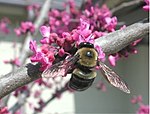Portal:Insects/Selected article/5
The effects suffered by bees from toxic chemicals that they encounter in the environment can be severe. These chemicals include various man-made compounds, such as insecticides and fertilizers, as well as a variety of naturally-occurring chemicals from plants, such as ethanol resulting from the fermentation of organic material. Intoxication in bees can result from exposure to ethanol from fermented nectar, ripe fruits, and man-made and natural chemicals in the environment.
The effects of alcohol on bees are sufficiently similar to the effects of alcohol on humans that honey bees have been used as models of human ethanol intoxication. However, the metabolism of bees and humans is sufficiently different that bees can safely collect nectar from plants that contain compounds toxic to humans. The honey produced by bees from these toxic nectars can be poisonous if consumed by humans. Many humans have eaten toxic honey and become quite ill as a result. Natural processes can also introduce toxic substances into nontoxic honey produced from nontoxic nectar. Microorganisms in honey can convert some of the sugars in honey to the toxic compound ethanol. This process of ethanol fermentation is intentionally harnessed to produce the alcoholic beverage mead from fermented honey.

